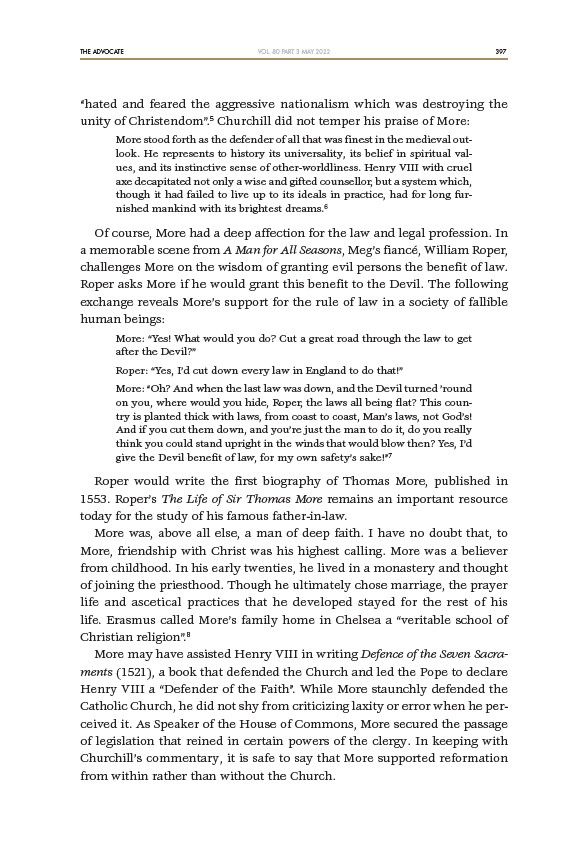
THE ADVOCATE 397
VOL. 80 PART 3 MAY 2022
“hated and feared the aggressive nationalism which was destroying the
unity of Christendom”.5 Churchill did not temper his praise of More:
More stood forth as the defender of all that was finest in the medieval outlook.
He represents to history its universality, its belief in spiritual values,
and its instinctive sense of other-worldliness. Henry VIII with cruel
axe decapitated not only a wise and gifted counsellor, but a system which,
though it had failed to live up to its ideals in practice, had for long furnished
mankind with its brightest dreams.6
Of course, More had a deep affection for the law and legal profession. In
a memorable scene from A Man for All Seasons, Meg’s fiancé, William Roper,
challenges More on the wisdom of granting evil persons the benefit of law.
Roper asks More if he would grant this benefit to the Devil. The following
exchange reveals More’s support for the rule of law in a society of fallible
human beings:
More: “Yes! What would you do? Cut a great road through the law to get
after the Devil?”
Roper: “Yes, I’d cut down every law in England to do that!”
More: “Oh? And when the last law was down, and the Devil turned ’round
on you, where would you hide, Roper, the laws all being flat? This country
is planted thick with laws, from coast to coast, Man’s laws, not God’s!
And if you cut them down, and you’re just the man to do it, do you really
think you could stand upright in the winds that would blow then? Yes, I’d
give the Devil benefit of law, for my own safety’s sake!”7
Roper would write the first biography of Thomas More, published in
1553. Roper’s The Life of Sir Thomas More remains an important resource
today for the study of his famous father-in-law.
More was, above all else, a man of deep faith. I have no doubt that, to
More, friendship with Christ was his highest calling. More was a believer
from childhood. In his early twenties, he lived in a monastery and thought
of joining the priesthood. Though he ultimately chose marriage, the prayer
life and ascetical practices that he developed stayed for the rest of his
life. Erasmus called More’s family home in Chelsea a “veritable school of
Christian religion”.8
More may have assisted Henry VIII in writing Defence of the Seven Sacraments
(1521), a book that defended the Church and led the Pope to declare
Henry VIII a “Defender of the Faith”. While More staunchly defended the
Catholic Church, he did not shy from criticizing laxity or error when he perceived
it. As Speaker of the House of Commons, More secured the passage
of legislation that reined in certain powers of the clergy. In keeping with
Churchill’s commentary, it is safe to say that More supported reformation
from within rather than without the Church.